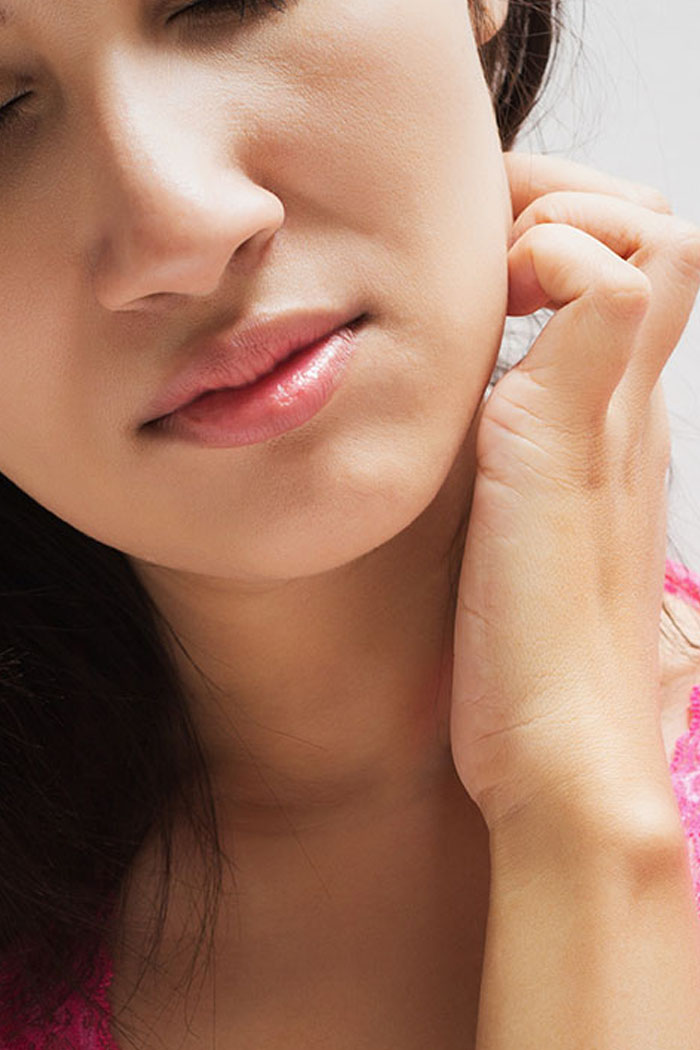Too much of this good thing can lead to worsening itch, excoriations, scars, and even skin infections - not to mention prominent under-eye circles from a poor night’s sleep.
 Trigger-happy Nerves: You may feel persistently itchy, zingy, or twingy due to nerve dysfunction - like after a neck injury (which can cause itching near the shoulder blades, called nostalgia parasthetica), or a tweak of the nerves in the arms and forearms (brachioradial pruritus), or in an area where the skin is recovering from shingles (post-herpetic neuralgia).
Infection: Some of us itch because of a skin infection - such as a fungus (tinea) or a mite (like scabies) - or a body-wide infection, such as measles or chickenpox (though no one should have to suffer from these particular diseases anymore, on account of safe and effective vaccines).
Medicine: Sometimes, the problem can be due to an oral medicine. Heart and cholesterol drugs, pain medicines, and antibiotics are among many that have the potential to cause scratch-happy tendencies.
Gluten: An intensely itchy rash called dermatitis herpetiformis can develop in some people with Celiac disease - but this skin condition is actually quite rare. (I've only seen 2 or 3 cases in my career.) True food allergies can certainly cause skin reactions, but gluten and other dietary factors are actually surprisingly uncommon reasons for itching.
Age: As we enter our 50’s and beyond, the skin tends to become drier, the epidermis often doesn’t function as optimally, its pH can change, there may be reduced immune function within the skin, and we are more likely to develop nerve degeneration or dysfunction - all of which may contribute to uncomfortably itchy skin.
Fingernail-induced: Sometimes, itching is our own fault. Conditions called prurigo nodularis (picker’s nodules) and lichen simplex chronicus form when we repeatedly pick or scratch at an area, causing the skin to thicken up and become even itchier - a vicious cycle with the potential to snowball out of control.
Medical Conditions: If you have no rash on the skin, but feel itchy everywhere, it may be time for some lab work. Many medical concerns can trigger itching, including problems with the thyroid, kidney, liver, blood count, an undetected infection, or even an emerging malignancy. I saw a patient last year who’d seen over a dozen doctors in a desperate attempt to get relief from unrelenting, allover itching she’d been experiencing for months - but once we detected and treated a urinary tract infection, her itching vanished within days.
Trigger-happy Nerves: You may feel persistently itchy, zingy, or twingy due to nerve dysfunction - like after a neck injury (which can cause itching near the shoulder blades, called nostalgia parasthetica), or a tweak of the nerves in the arms and forearms (brachioradial pruritus), or in an area where the skin is recovering from shingles (post-herpetic neuralgia).
Infection: Some of us itch because of a skin infection - such as a fungus (tinea) or a mite (like scabies) - or a body-wide infection, such as measles or chickenpox (though no one should have to suffer from these particular diseases anymore, on account of safe and effective vaccines).
Medicine: Sometimes, the problem can be due to an oral medicine. Heart and cholesterol drugs, pain medicines, and antibiotics are among many that have the potential to cause scratch-happy tendencies.
Gluten: An intensely itchy rash called dermatitis herpetiformis can develop in some people with Celiac disease - but this skin condition is actually quite rare. (I've only seen 2 or 3 cases in my career.) True food allergies can certainly cause skin reactions, but gluten and other dietary factors are actually surprisingly uncommon reasons for itching.
Age: As we enter our 50’s and beyond, the skin tends to become drier, the epidermis often doesn’t function as optimally, its pH can change, there may be reduced immune function within the skin, and we are more likely to develop nerve degeneration or dysfunction - all of which may contribute to uncomfortably itchy skin.
Fingernail-induced: Sometimes, itching is our own fault. Conditions called prurigo nodularis (picker’s nodules) and lichen simplex chronicus form when we repeatedly pick or scratch at an area, causing the skin to thicken up and become even itchier - a vicious cycle with the potential to snowball out of control.
Medical Conditions: If you have no rash on the skin, but feel itchy everywhere, it may be time for some lab work. Many medical concerns can trigger itching, including problems with the thyroid, kidney, liver, blood count, an undetected infection, or even an emerging malignancy. I saw a patient last year who’d seen over a dozen doctors in a desperate attempt to get relief from unrelenting, allover itching she’d been experiencing for months - but once we detected and treated a urinary tract infection, her itching vanished within days.



